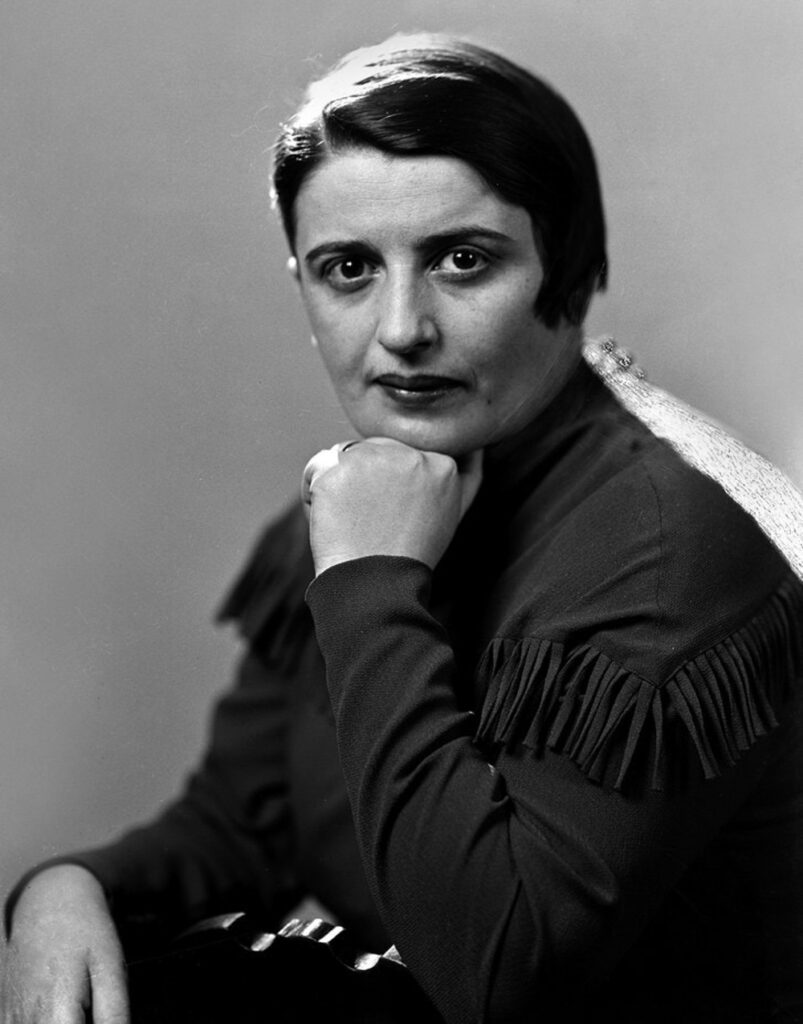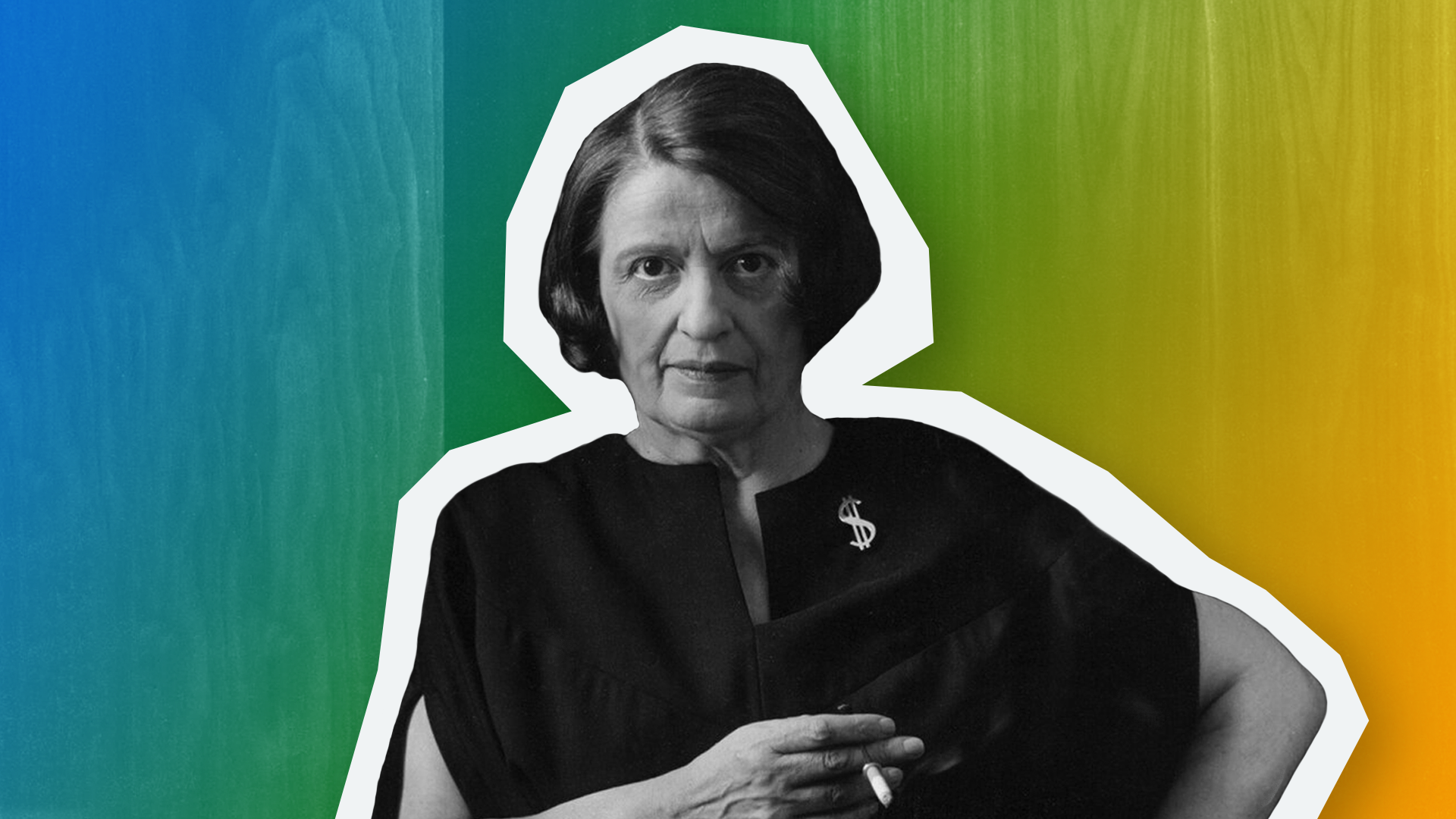Ayn Rand, a celebrated author and philosopher, was one of the most influential thinkers of the 20th century. Known for her bestselling novels, such as The Fountainhead and Atlas Shrugged, Rand’s ideas have had a profound impact on the fields of politics, economics, and philosophy.
Born Alisa Zinovyevna Rosenbaum in Tsarist Russia in 1905, Ayn Rand witnessed firsthand the upheaval of the Bolshevik Revolution and the repressive communist regime that ensued.
Rand’s family had been well-off, but they suffered greatly under the Bolsheviks. The state confiscated her father’s pharmacy, and the family struggled to survive under the new regime.
Always bright, Ayn Rand studied at Petrograd State University. Her education was interrupted when the Soviet regime purged her from the university, although she was later reinstated and able to graduate.
In 1926, at the age of 21, Rand arrived in the United States. She subsequently worked various jobs connected to the Hollywood movie industry, first as an extra, then as a junior screenwriter. From there, she developed her career as a novelist.

Ayn Rand’s novels
In her works, Rand explores complex topics such as the nature of morality, the role of government, and the power of the individual. Her writing style is marked by a bold and uncompromising approach to these subjects, making her ideas both challenging and thought-provoking.
Ayn Rand’s novels are known for their philosophical themes and exploration of individualism, reason, and self-interest. Her most famous novel, Atlas Shrugged, is a sweeping epic that depicts a universe in which the most creative and productive members of society go on strike, withdrawing their talents and innovations from a world that seeks to punish and exploit them.
Another of Rand’s most well-known novels, The Fountainhead, explores the conflict between individualism and collectivism through the story of an uncompromising architect who refuses to conform to the established norms of his profession. The novel has been praised for its celebration of creativity, independence, and personal integrity, as well as its critique of conformity and mediocrity.
Rand’s early novels, including We the Living and Anthem, similarly explore themes of individualism, freedom, and the struggle against oppressive societies. We the Living is set in Soviet Russia and draws on Rand’s personal experience of living under the communist regime. It portrays the struggles of a young woman trying to maintain her individuality and independence in a society that seeks to crush her spirit.
Anthem is a dystopian novel set in a future society in which any form of individuality is forbidden to the point where even the word “I” has been eliminated from the language.
One common thread that runs throughout Rand’s novels is her celebration of the individual and her rejection of the idea that individuals should be subordinated to the needs or desires of the collective. Her characters are often strong-willed and tenacious, standing up for their values and refusing to compromise their principles even in the face of opposition or persecution.
(Read more about Ayn Rand’s most famous novel in the article “Atlas Shrugged: a masterpiece with a lasting impact“).
Ayn Rand’s philosophy
Ayn Rand had a remarkable ability to weave together ideas from various disciplines, including philosophy, psychology, and economics, to create a unique and comprehensive worldview. Her philosophy of Objectivism, which emphasizes individualism, reason, and self-interest, has served as a catalyst for debate and discussion for decades.
Ayn Rand first presented her philosophy through her works of fiction, but she later elaborated on it more explicitly in several nonfiction works, including The Virtue of Selfishness and Capitalism: The Unknown Ideal, among others.
Reality exists
Objectivism is different from other philosophies in several ways. One of the most fundamental distinctions is its emphasis on reason and individualism. Objectivism holds that reason is man’s primary means of survival and that each individual has the right to pursue their own happiness by acting in their rational self-interest. This stands in stark contrast to other philosophies, such as existentialism and postmodernism, which often emphasize subjective experience and reject the idea of objective reality.
Individualism vs. collectivism
Another key distinction is Objectivism’s rejection of collectivism and altruism. Rand believed that the collective was a false construct that denied the importance of the individual and that altruism, the idea that individuals should sacrifice their own interests for the sake of others, was a moral ideal that was fundamentally flawed. This puts Objectivism in direct opposition to many other philosophies that place a high value on collectivism and altruism, such as socialism and certain forms of religious and spiritual belief.
Ayn Rand on rights
Objectivism also places a strong emphasis on the concept of rights. Rand argued that individuals have the inalienable right to their own lives and to live according to their rational self-interest and that any attempt to violate these rights, whether by the government or other individuals, is morally wrong. In its focus on individual rights and the importance of protecting them against collectivist encroachment, Objectivism provides a firm philosophical defense of liberty.
Ayn Rand on capitalism
Finally, Objectivism is distinct in its embrace of laissez-faire capitalism as the only moral economic system. Rand believed that a truly free market, where individuals were free to pursue their own rational self-interest, was the best way to achieve prosperity and personal happiness.
Applying Ayn Rand’s philosophy of Objectivism
Rather than focusing on the political sphere, the best place to start applying Ayn Rand’s philosophy of Objectivism is in our own lives — a domain where each individual has agency. So what does this look like in practice?
Objectivism emphasizes the importance of pursuing rational self-interest to achieve happiness and fulfillment. This means taking responsibility for one’s own life and making choices that promote one’s long-term goals and values.
Furthermore, it is important to recognize that nobody owes anyone anything by virtue of their existence. We must each live for our own sake and not out of a sense of duty toward others. This involves developing a strong sense of self-esteem, self-worth, and self-respect.
To live a fulfilling life, individuals must identify their values and strive to pursue them to the best of their ability. Learning and personal development are important in striving to fulfill our values, and developing a rational and objective understanding of the world is crucial.
Quotes to remember
“It is not death that we wish to avoid, but life that we wish to live.”
“If concern with poverty and human suffering were the collectivists’ motive, they would have become champions of capitalism long ago; they would have discovered that it is the only political system capable of producing abundance.”
“Any alleged “right” of one man, which necessitates the violation of the rights of another, is not and cannot be a right. No man can have a right to impose an unchosen obligation, an unrewarded duty or an involuntary servitude on another man.”
“The smallest minority on earth is the individual. Those who deny individual rights cannot claim to be defenders of minorities.”
“Achievement of your happiness is the only moral purpose of your life, and that happiness, not pain or mindless self-indulgence, is the proof of your moral integrity, since it is the proof and the result of your loyalty to the achievement of your values.”
“The purpose of morality is to teach you, not to suffer and die, but to enjoy yourself and live.”
(For more Ayn Rand quotes, be sure to check the article “7 Ayn Rand quotes for living a fulfilling life“)
Be sure to click on the button below to get your free copy of the e-book “The Morality of Capitalism,” where you can find a strong moral defense of capitalism through a collection of articles written by experts, including Nobel Prize winner Vernon Smith.
Are you a student interested in getting involved in pro-liberty activism? By applying to join Students For Liberty’s Local Coordinator Program, you can be supported in promoting the ideas of liberty while also developing your skills and meeting many like-minded students from across the world. Click on the button below to find out more and get involved!
This piece solely expresses the opinion of the author and not necessarily the organization as a whole. Students For Liberty is committed to facilitating a broad dialogue for liberty, representing a variety of opinions.



